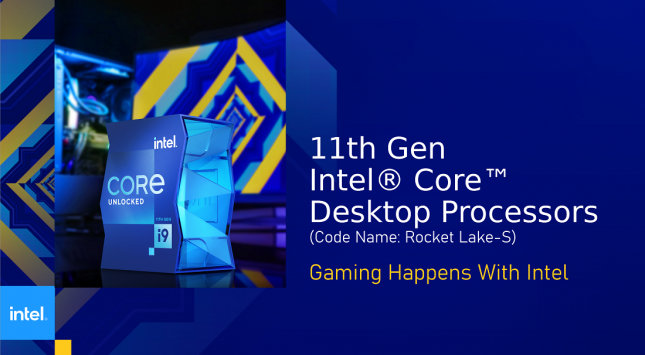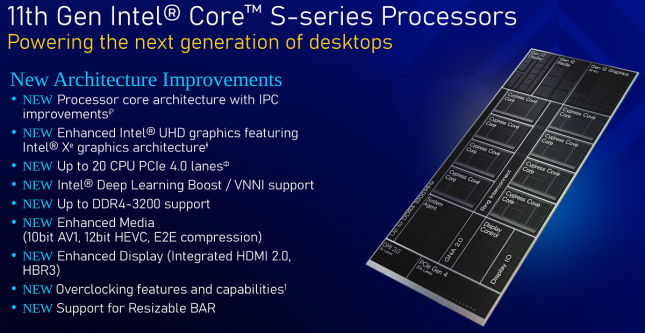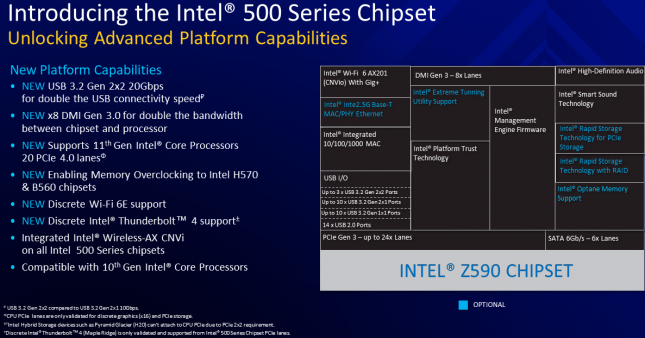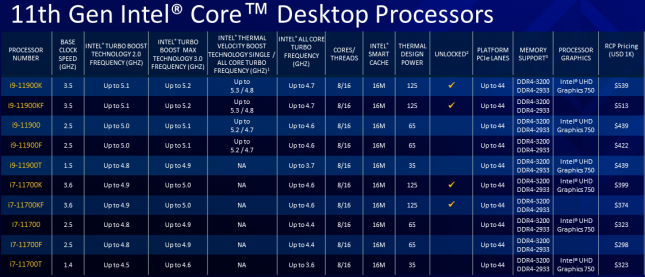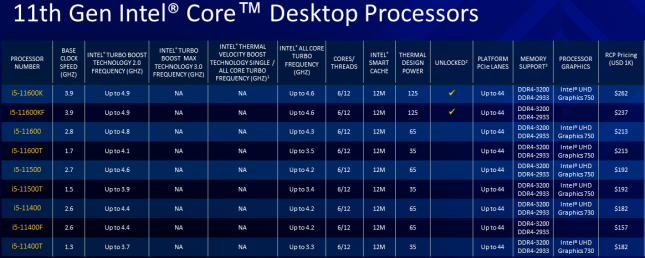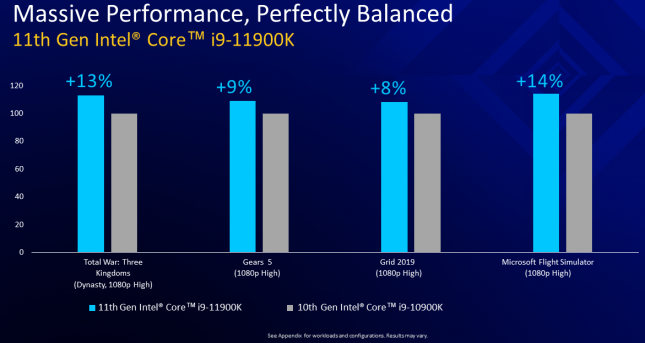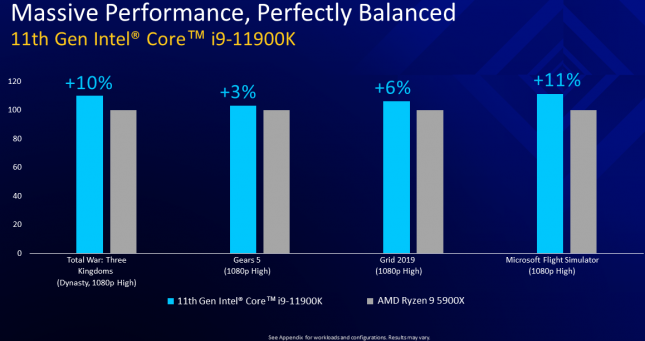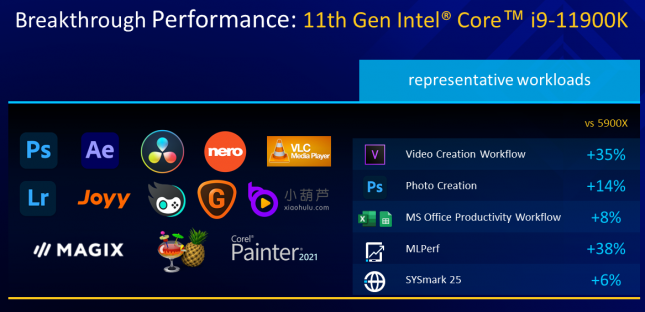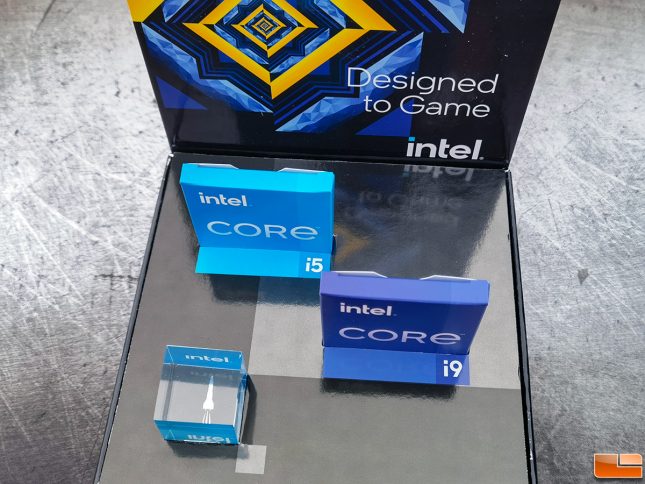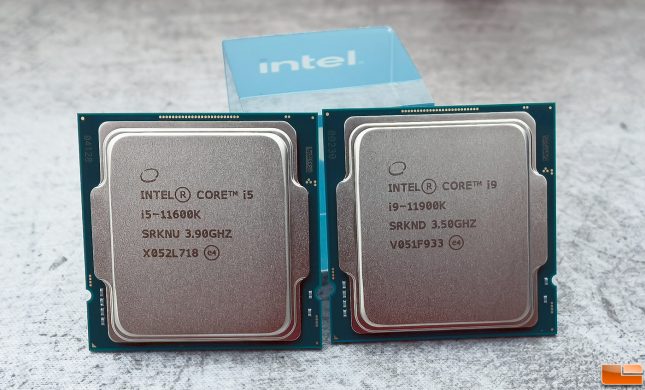Intel Rocket Lake Desktop Processors Arrive
Intel will be selling their 11th Gen Core ‘Rocket Lake’ desktop CPU series and the end of the month and we have more details to share today. Rocket Lake-S is a very interesting desktop processor series as they backported their 10nm architecture to 14nm. This gave Intel the ability to get higher clock frequencies, but the larger manufacturing process cost them two cores and higher power consumption.
Giving up cores may sound a bit crazy, but Intel ‘Rocket Lake’ CPUs have a 19% IPC improvement. Going from 10-cores to 8-cores for this series reduces the number of cores by 20%. The final result is a chip that will perform better or worse than it’s predecessor depending on the workloads. Most single-threaded tasks, lightly threaded applications and PC game titles should reap the benefits from the IPC gains. In heavily threaded workloads the Rocket Lake chips might struggle to handle all the software applications due to the limited number of threads. Intel saw the backport as as being the best path forward.
There is more to Rocket Lake-S than IPC gains though as the integrated graphics performance is 50% better and they also have AI integration for the first time with Intel Deep Learning Boost. You also have up to 20 CPU PCIe 4.0 lanes for the very first time and official support for DDR4-3200 memory. Intel has lagged behind their rival for official memory clocks for a long time and the lack of PCIe 4.0 support has helped AMD sell platforms. Intel is finally able to deliver features that consumers and enthusiasts have wanted for a long time.
The really good news is that Intel has had plenty of time to figure out 14nm and they should be able to supply the market with plenty of chips. AMD processors are made on the 7nm process and production seems to be constrained. The vast majority of AMD’s latest Zen 3 processors have been consistently sold out since being introduced. AMD uses an outside manufacturing partner to produce there chips whereas Intel makes their own chips at internal fabs. That said, Intel recemtly entrusted Samsung and Taiwan Semiconductor Manufacturing Co. (TSMC) to start making chips for them. Samsung is starting to produce chipsets and TSMC is making GPUs for Intel’s discrete graphics card business. Outsourcing some chip production will allow Intel to focus more making CPUs on both the 10nm and 14nm fabrication process.
11th Gen Intel Core S-Series processors us the LGA 1200 socket that was introduced in 2020 with 10th Gen Comet Lake processors. This means most Intel 400 series chipset boards should support Rocket Lake after a BIOS/UEFI update. Some Intel Z490 boards were PCIe 4.0 ready, but some were not. To get the best experience from the Rocket Lake processors the Intel 500 series chip was recently introduced. It features full PCIe 4.0 support, but also newer features like USB 3.2 Gen 2×2 (20Gbps), x8 DMI Gen 3.0, WiFi 6E support and more. These boards are already on the market.
So, let’s take a closer look at the Rocket Lake-S lineup as it is Intel’s answer to AMD’s Zen 3 lineup of desktop processors.
Intel has 19 different Rocket Lake-S processors to pick from right now in the Core i5, Core i7, and Core i9 series. Pricing start at $157 for the Core i5-11400F 6C/12T part and goes up to $539 for the Core i9-11900K 8C/16T chip. In fact, these are the only two core options available on 11th Gen Rocket Lake-S processors.
Intel still has the ‘F’ sub-class available on some parts and this means they lack integrated graphics. For example the Intel Core i9-11900KF is basically the same thing as the Core i9-11900K without the ability to do graphics tasks. Pricing for the Core i9-11900KF is $513 and that is a savings of $26. Other unlocked models without graphics include the Core i7-11700KF, Core i5-11600KF and the Core i5-11400KF. All are 125W parts with the exception of the 11400KF as that is a 65W part.
When it comes to gaming performance the 11th Gen Intel Core i9-11900K was shown to do between 8-14% better than the 10th Gen Intel Core i9-10900K processor. These numbers were done by Intel and the four game titles they picked to use were Microsoft Flight Simulator, Grid 2019, Gears 5, and Total War: Three Kingdoms.
Using the same game titles Intel then showed performance of the 11th Gen Intel Core i9-11900K processor compared to the AMD Ryzen 9 5900X (Zen 3) processor. Here they were found to be 3-11% faster than one of its prime competitors.
Intel also showed some 11900K performance numbers that were aimed at content creators. Here they showed that they were 88% faster on video creation workflow versus 10th Gen and 35% faster than AMD Ryzen 9 5900X. On Microsoft Office they were 12% faster than 10th Gen and 8% faster than the than AMD Ryzen 9 5900X.
Intel sent Legit Reviews one Intel Core i9 and Core i5 processor from the Rocket Lake-S series to review. We aren’t able to publish results until March 30th, 2021. The public relations department came up with some special packaging for reviewers kits that included a little Intel cube that had a rocket under it.
The Intel Core i5-11600K is priced at $262 and offers 6-cores and 12-threads with a 3.9GHz base frequency with a maximum turbo frequency of 4.9GHz. This is the base unlocked “K” SKU processor and is a 125W TDP part with 12M of Intel smart cache. The all core turbo frequency is 4.6 GHz and it should be appealing to those that are looking for high-end features with the lowest price tag.
The other processor that we were sent was the Intel Core i9-11900K. This is the LGA1200 flagship CPU for the Rocket Lake-S series and offers 8-cores, 16-threads for $539. It has a 3.5GHz base clock, 4.7GHz all core turbo clock and the ability to boost up to 5.2GHz with Intel turbo boost max technology 3.0. This chip has 16M of Intel Smart Cache and the same 125W TDP found on its smaller sibling.
These are the two Rocket Lake-S processors that Intel sent out to reviewers. We will have a full performance review of both of these chips at the end of the month!

